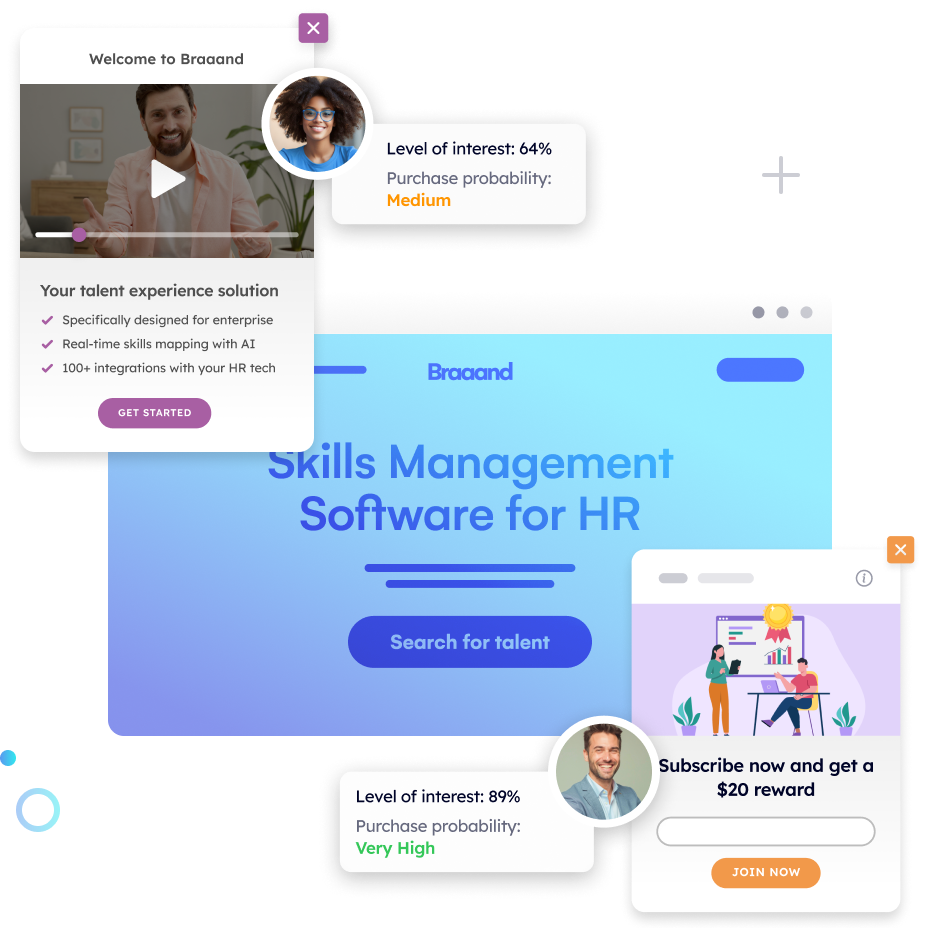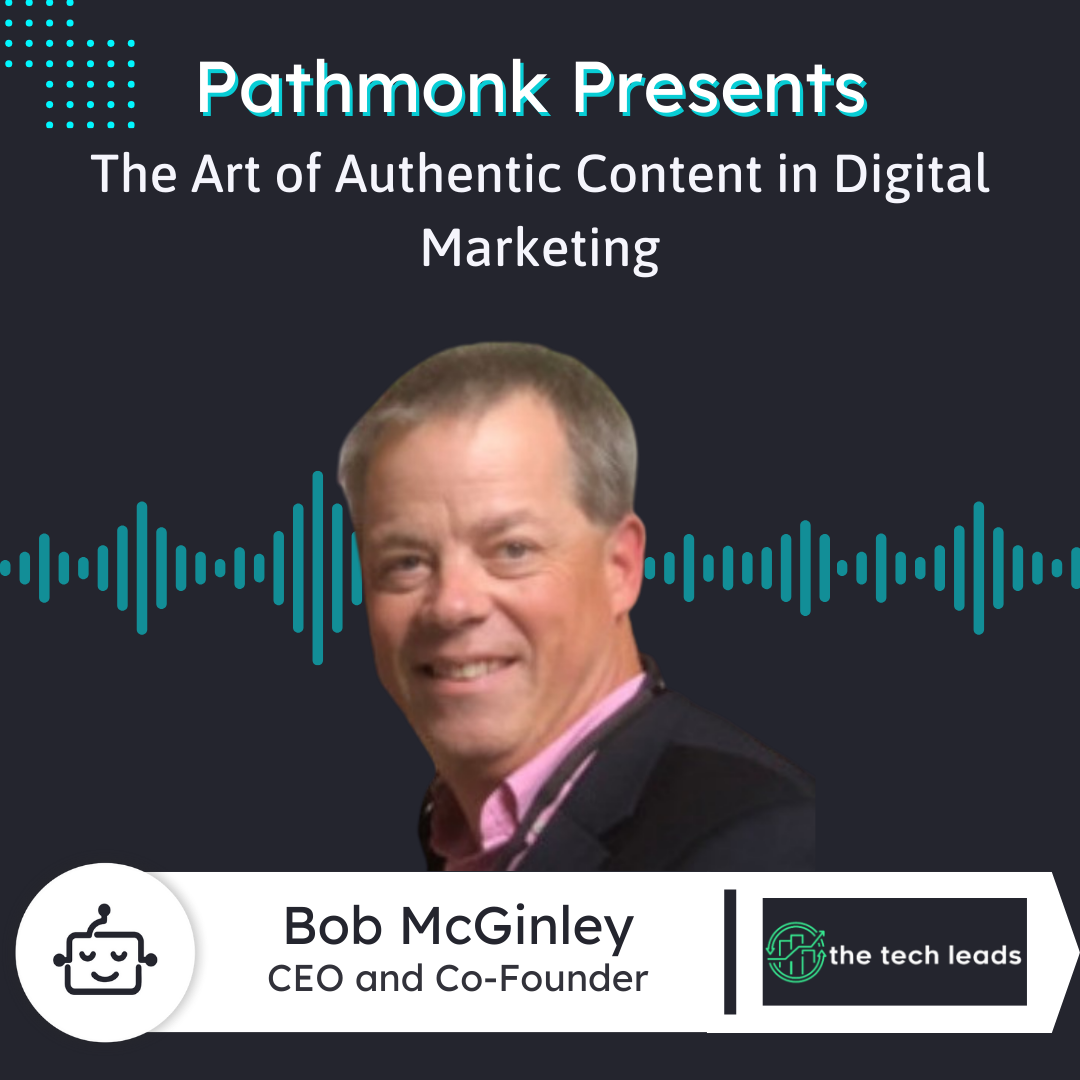
Introduction
Meet Bob McGinley from The Tech Leads, a seasoned fractional CMO and technical sales expert who transforms growing businesses through strategic leadership.
In this episode, Bob shares his journey from leading technical sales at Software1 to founding his own consulting firm. He discusses how he identified a gap in the market for affordable, high-quality consulting services for SMBs and growing tech companies. Bob reveals his unique approach to content creation, emphasizing authenticity and personal storytelling, while sharing insights on building credibility through strategic networking and LinkedIn optimization.
His practical advice on lead generation and relationship building makes this episode invaluable for business leaders and marketers alike.
Increase +180% conversions from your website with AI
Get more conversions from your existing traffic by delivering personalized experiences in real time.
- Adapt your website to each visitor’s intent automatically
- Increase conversions without redesigns or dev work
- Turn anonymous traffic into revenue at scale

Kevin Shirley: Welcome to the Pathmonk Presents podcast. Pathmonk is the AI for website conversions. With increasing online competition, over 98% of website visitors don’t convert. The ability to successfully show your value proposition and support visitors in their buying journey separates you from the competition online. Pathmonk qualifies and converts leads on your website by figuring out where they are in the buying journey and influencing them in key decision moments with relevant micro experiences like case studies, intro videos, and much more. Stay relevant to your visitors and increase conversions by 50% by adding Pathmonk to your website in seconds, letting the artificial intelligence do all the work and increase your conversion by 50% while doing marketing as usual. Check us out on pathmonk.com.
Okay everybody, welcome to today’s podcast for Pathmonk Presents. I’m really excited today. We’ve got Bob from The Tech Leads on the line. How are you today, Bob?
Bob McGinley: I’m great, Kevin, thanks for having me.
Kevin Shirley: No problem. Glad to have you on. So, being that this is a podcast all about growth and marketing and digital strategies, and you being a fractional CMO, I wanted to make sure that we take the time to talk about what we’re doing from your perspective for multiple clients, but also for your own business. As it is, we could get started with a very basic open-ended question. Who are your clients? Do you focus on any specific areas? What sort of industries do you particularly work in? Why don’t you just give us the lay of the land?
Bob: So we got the idea to do this probably about a little more than a year ago. I was working at Software1, leading technical sales for North America, and we were doing a lot of outreach to clients and getting these clients into the mix that we didn’t really know the size of their business or where they were in their journey. We started to notice some patterns showing up with them—they were doing well, generating revenue, and had some level of growth, but they had hit a roadblock.
These roadblocks were sometimes technical, sometimes about getting the right resources, or sometimes someone had left the business, leaving them stuck trying to get their stuff up and running. We saw all these challenges around technology and business growth. We would go in and offer them consulting services, but when it came time to give them the sticker price, you could just see the blood leave their heads. They weren’t in a position to pay for a high-value consulting company like Software1.
They did have some money to invest but at a much smaller price point. So, I got the idea to help these companies hone in on their challenges, clear those hurdles, and get back to growing and scaling their business.
The initial focus was on small-to-medium businesses, particularly ISVs and tech companies. Then it branched out to companies that had lost an executive and needed someone to fill the gap during the hunt for a replacement. Lastly, we started working with venture capital firms that notice their high-growth companies are missing key leadership roles but don’t yet have the capital to hire expensive C-suite executives. We step in to fill that gap and help these companies reach the level where they can warrant further investment.
Kevin Shirley: Interesting. So basically, SMBs with a gap to fill, and VCs with potential opportunities that need an executive in the right place say, “Bob’s the right guy to put in there.”
Bob: Yes, exactly.
Kevin Shirley: That’s interesting. To stay on the same topic, let’s talk about acquiring clients specifically for your business. How do you go about acquiring clients, whether it’s one of these small-to-medium-sized businesses or one of the venture capital firms? How do you typically find them or get in touch with them?
Bob: Yeah, you know, this is where I think age and experience have some benefits in the game. I’ve done a lot of networking over the years, and I’ve always been very careful not to burn bridges. Most of my business at this point has come from referrals and word of mouth.
The challenge in this type of role is that you need credibility. People need to vouch for you, saying, “This guy’s done the work, he’s been at the C-suite level, he’s worked with global corporations,” and that builds trust.
So far, the growth we’ve had—especially in the past few months—has been through word of mouth and referrals. We’ve looked at advertising options like Google Ads and LinkedIn ads and will probably do some of that in the future. But right now, the focus has been on leveraging my network.
Kevin Shirley: Awesome. So, let’s transition to your website and some metrics. If your website isn’t acting as a client acquisition tool or a lead generation tool, is it more about client education or qualifying yourself for potential clients?
Bob: Exactly. The website is a work in progress. We’re still a small company, and I’ve done all the website work myself. One benefit of having a technical background is saving money by doing some of that work. That said, I still face challenges, especially around SEO and optimizing the site.
The website is more of a qualification tool. It gives people a sense of who we are and what we do. But as we grow, improving the website will definitely become a higher priority, and that’s something I’d be interested in potentially working on with Pathmonk.
Kevin Shirley: Interesting. We’d love to have you as a partner! Speaking of websites, let’s talk about metrics. What metrics do you think are the most important for marketers to focus on?
Bob: I’m a sales guy at heart, so pipeline is everything. If you don’t have a pipeline, you’re dead. Generating leads and developing a pipeline is critical.
I’m also a big proponent of content development. But it’s a strange world these days with AI and the overwhelming amount of content out there. It’s hard to create content that stands out and gets attention. People are becoming numb to generic, robotic content.
So, we focus on creating content that’s unique, engaging, and brings some personality to the table. I don’t want to just churn out ChatGPT responses. I make an effort to write with humor and wit, tying in stories from my own experiences to make the content relatable.
Kevin Shirley: Yeah, people can sense when content is robotic versus authentic. I think being real and personal in your storytelling makes a big difference.
Bob: Exactly. It’s all about connection. If you’re just generating content without injecting your personality or authenticity into it, you’re going to struggle to make meaningful connections.
Kevin Shirley: Well said. I think storytelling is such a powerful way to build trust and connect with your audience. When it comes to marketing campaigns or growing a website, what are some tools or methods that you regularly use?
Bob: One thing we’ve been working on is a scoring tool for businesses—a simple online questionnaire where companies can assess their health across key areas like operations, marketing, and technology. It’s valuable for both parties because businesses get an actionable report, and we gain insight into where they might need help.
It’s also a great lead generation tool. For example, if a company is struggling with change management or pricing strategy, the responses highlight those areas. We can follow up with tailored solutions, offering real value right from the start.
Another key method I use is LinkedIn. It’s such a versatile tool for networking and sharing insights. I don’t pay for premium features anymore because I find that just posting regularly and engaging with others is enough. I’m also strategic with sales calls—when someone pitches me a product, I use that opportunity to share my business too.
Kevin Shirley: That’s a clever approach—using sales calls as a networking tool. I think you’re tapping into the idea of social selling, but with a unique spin.
Bob: Exactly. It’s about expanding the network and creating opportunities. If a salesperson calls me with a product I don’t need, I still try to make a connection. I tell them, “If you come across a client who’s not ready for your solution but needs foundational help, send them my way.” It’s about creating a referral ecosystem.
Kevin Shirley: Absolutely. And that brings me to my next question. What are some of the key tasks you focus on daily as a fractional CMO?
Bob: I structure my day into three parts:
- Current Clients: A big chunk of my day is spent ensuring my current clients are happy. This includes resolving issues, managing deliverables, and maintaining customer satisfaction.
- Lead Generation: I dedicate time to filling the pipeline—whether that’s writing content, improving the website, or connecting with potential clients.
- Continuous Education: I’m a firm believer in staying sharp. Whether it’s earning certifications or attending webinars, I dedicate time to learning and keeping up with trends, especially in areas like cybersecurity and AI.
Kevin Shirley: I like that structure. It’s a nice balance of serving current clients while preparing for future opportunities. Okay, let’s shift gears into the rapid-fire round. Ready?
Bob: Let’s do it!
Kevin Shirley: What’s the last book you read?
Bob: The Hemlock Cup: Socrates, Athens, and the Search for the Good Life by Bettany Hughes. It’s a fascinating dive into ancient Athens.
Kevin Shirley: Sounds interesting. What’s one thing your company is focused on the most right now?
Bob: Establishing the brand and maintaining high customer satisfaction to drive referrals and repeat business.
Kevin Shirley: If there were no boundaries in technology, what’s one thing you’d fix for your role as a marketer today?
Bob: I’d love a tool that instantly reveals a client’s deepest pain points and motivations—essentially their psychological profile.
Kevin Shirley: That would be a game-changer! What’s one repetitive task you’d automate?
Bob: Writing contracts and statements of work. If I could automate that entire process with dynamic pricing and documentation, it’d save so much time.
Kevin Shirley: Agreed. Last one—what’s one piece of advice you’d give your younger self if you were starting your marketing journey today?
Bob: Focus on relationships. Never burn bridges, even with people you don’t enjoy working with. Those connections might be invaluable down the road.
Kevin Shirley: That’s great advice. And now for the last word—if someone forgets everything from this interview, what’s the one thing they should remember about you and your company?
Bob: We’re here to help businesses avoid roadblocks and accelerate growth. Whether it’s marketing, technology, or strategy, we bring the expertise to get you where you need to go.
Kevin Shirley: Well said. Thanks so much, Bob, for joining us today. It’s been a pleasure having you on the show!
Bob: Thanks, Kevin. I really enjoyed it.




